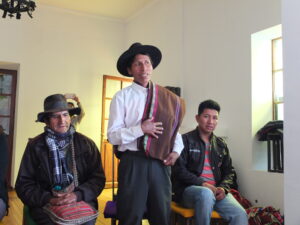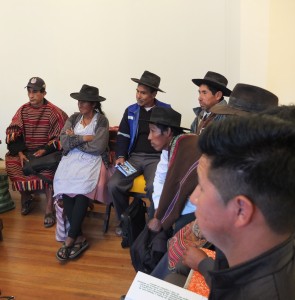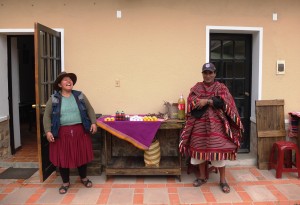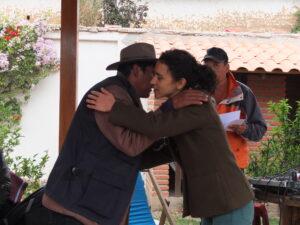Engaged Anthropology Grant: Adriana Carolina Borda Nino

While a doctoral student at the University of St. Andrews Adriana Carolina Borda Nino received a Dissertation Fieldwork Grant in 2011 to aid research on ”When Does Incest Matter’: Ethnic, Class & Gender Discourses & Experiences About Incest among Female Patients in a Psychiatric Hospital in Bolivia,” supervised by Dr. Tristan Platt. In 2016 Dr. Borda Nino received an Engaged Anthropology Grant to aid engaged activities on “Healing Trajectories: Engaging Andean Indigenous Healers’ in the Promotion of Women’s Rights”.
The workshop took place in the city of Sucre, Bolivia. Thirteen traditional healers from the Chuquisaca, Potosi, and Cochabamba regions took part in the workshop. Nine men and four women between jampiris, médicos naturistas, and midwives attended the event. Most of them were over forty years of age, but also some young participants who are learning Andean traditional healing practices in order to become healers themselves participated. Thus, perspectives from experienced healers were matched by the eagerness of young apprentices who will be the future’s healing practitioners and masters. Finally, the event had the logistic support and was enriched by the participation of members of staff of PRODECO, a Bolivian NGO that has worked for more than twenty years of experience in promoting Andean medicine practices from a gender, intercultural, rights, and generational perspective.

Topics covered during the workshop included: definitions of incestuous sexual violence within rural communities in Bolivia and in relation to current national and international legislation; trajectories of indigenous and peasant women who have survived incestuous sexual violence, from their communities of origin to the National Psychiatric; the psychiatric hospital as a place of in-between-life-and-death confinement for women, thus fulfilling Quechua and Aymara ideas on soul condemnation for women who have been involved in incestuous practices; the relevance of traditional healers in the definition of trajectories of violence against women within their communities; finally, we had a discussion with participants on different forms of approaching incestuous sexual violence from an Andean medicine point of view in the region.

The event included the participation of the eighty-year-old healer Mama Gloria, a highly regarded practitioner of Quechua medicine from Ecuador (much respected amongst Latin American traditional healers), who has a women’s rights approach to healing practices in relation to violence against women. It was suggested by all traditional healers that it is very relevant to include diverse approaches to the particular contexts where they apply their knowledge, considering local circumstances, amongst them: forms of community organization, role of traditional healers within the communities, closeness to cities, relation to judicial and allopathic medical authorities, etc. In this sense, the advice given by Mama Gloria on how to heal the effects that sexual violence might have on women and how to protect them both through healing practices and through working with judicial authorities, was very well received by the jampiris, médicos naturistas, and midwives, who took note of Mama Gloria’s advice as well as that given by their co-participants. They expressed their intention to apply what they learned at their communities. Finally, and as a result of the initiative of one of the four and oldest female healers, time was devoted to discussing the ethical protocols that should be followed by any traditional medicine practitioner when approaching a case of intrafamiliar sexual violence against women and in general any case of sexual violence against women.

During this event, the research results were disseminated and discussed (day I). In 2013 the Law No. 459 of December 19 2013, on Ancestral Traditional Bolivian Medicine, was passed. This law elevated the status of traditional medicine to that of Western medicine within Bolivia’s health system. Along with this recognition, the law seeks to regulate the practice and articulation of Bolivian ancestral traditional medicine within the national health system, as well as healers’ organizations, and the rights and responsibilities of service users. Traditional medicine practitioners, as stated by the workshop participants, are allowed and some are paid a salary to work at local hospitals. This is a process that is slowly developing. For instance, within the region of Chuquisaca only approximately ten healers receive a salary for working at local hospitals. The state, though, grants a higher number of healers a sum of money to get the ingredients to prepare medicaments to sell. However, the work of traditional healers at psychiatric hospitals is still forbidden, as is their intervention in cases of sexual violence attended within local hospitals. All the diagnosis gathered during the research were confirmed by the workshop participants, as well as the trajectories followed by women who are expelled from their communities after surviving events of sexual violence.

The applicability of the research results and the conclusions of the exchange that was possible during the workshop’s first day amongst the participants, were discussed during the second day. In 2013 a new law on violence against women was issued in the country. It states that all health authorities are responsible for protecting and securing the well-being of women who have experienced any form of violence. This poses a great challenge to traditional medicine practitioners, for they are not only entitled (as they are part of the health system, though not yet in equal conditions) but also made responsible to intervene in these cases. The workshop participants expressed their concern that judicial authorities should intervene first before they can approach a case, for they would be afraid of breaking the law by becoming involved. There is no guidance on how exactly it is expected that traditional medicine practitioners should intervene according to this law. Also, it was expressed by the participants that there is still a long way to go before the participation of traditional medicine practitioners within mental health settings is permitted. Still, they stated that there is a boundary between the cases in which only psychiatrists should intervene, i.e. what they called traumado or a traumatized person, and those that can be healed by them, i.e. susto, agarrado por tierra, and other ailments that occur as a consequence of events of sexual violence on survivors. In this way, traditional medicine practitioners recognized the importance of both Western and Andean traditional medicine in promoting the well-being of women who have experienced sexual violence.
At the end of the workshop a session was held with participation of traditional medicine practitioners as well as representatives of several non-governmental organisations in charge of promoting women’s rights to discuss the research results (governmental authorities were invited but did not attend the session). As during the first part of the workshop, all the findings presented were ratified by the participants. New facts unknown by them, especially on the treatment of women within the psychiatric setting, were received with surprise but were deemed plausible, given the lack of involvement of both NGO’s and healers in this type of setting. This session served to introduce Andean healers with representatives of these organisations, and it is hoped that future work might be done to develop a dialogue between these two sectors in order to promote collaboration for the protection of the rights of women who have experienced incestuous sexual [and other forms of] violence.
A final addition to the event was a small fair organised by PRODECO to promote the work of the Andean medicine practitioners at the workshop venue, which was opened for the general public. During this fair several diagnosis, healing sessions, and medicine sales took place.